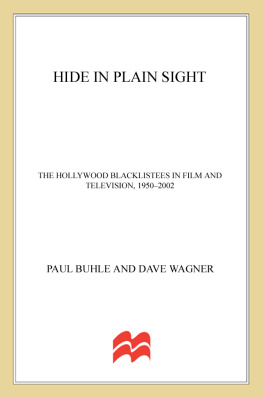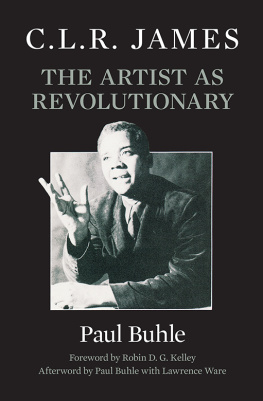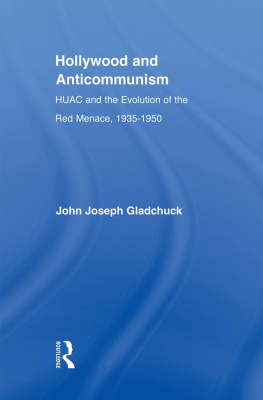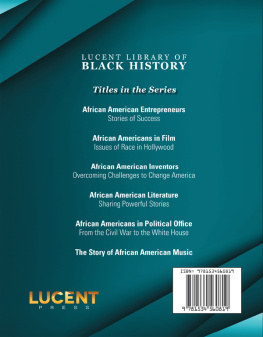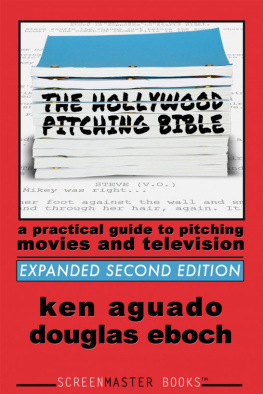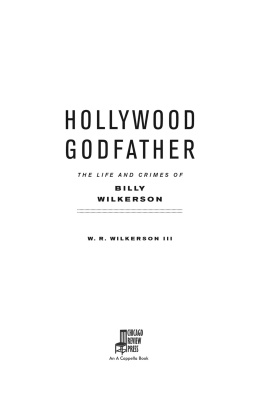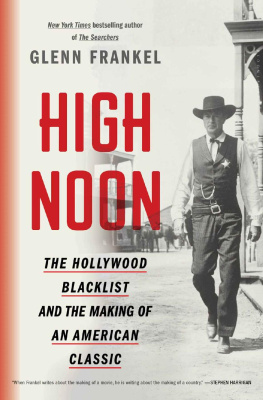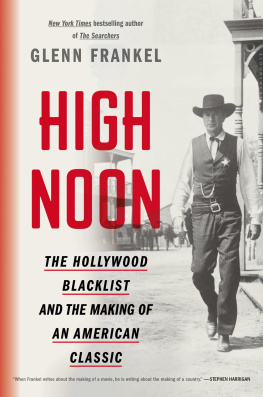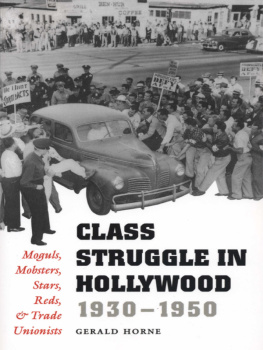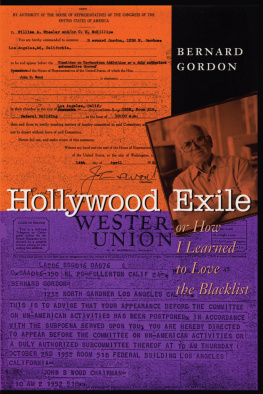A LSO BY
P AUL B UHLE
Marxism in the United States
C. L. R. James: The Artist as Revolutionary
Popular Culture in America
History and the New Left: Madison, Wisconsin, 19501970
Encyclopedia of the American Left
(co-edited with Mari Jo Buhle and Dan Georgakas)
The Immigrant Left in the United States
(co-edited with Dan Georgakas)
William Appleman Williams: The Tragedy of Empire
(with Edward Rice-Maximin)
C. L. R. Jamess Caribbean
(co-edited with Paget Henry)
Tender Comrades: A Backstory of the Hollywood Blacklist
(with Patrick McGilligan)
Images of American Radicalism
(with Edmund Sullivan)
Taking Care of Business: Samuel Gompers, George Meany,
Lane Kirkland and the Tragedy of American Labor
Insurgent Images: The Agitprop Art of Mike Alewitz
The New Left Revisited
(co-edited with John McMillian)
A LSO B Y P AUL B UHLE
AND D AVE W AGNER
A Very Dangerous Citizen: Abraham Lincoln Polonsky and the Hollywood Left
Radical Hollywood
The Film Lovers Guide to the Blacklist Movie
The author and publisher have provided this e-book to you for your personal use only. You may not make this e-book publicly available in any way. Copyright infringement is against the law. If you believe the copy of this e-book you are reading infringes on the authors copyright, please notify the publisher at: http://us.macmillanusa.com/piracy.
Thank you for buying this
St. Martins Press Macmillan ebook.
To receive special offers, bonus content,
and info on new releases and other great reads,
sign up for our newsletters.

Or visit us online at
us.macmillan.com/newslettersignup
For email updates on the author, click here.
HIDE IN PLAIN SIGHT
The Hollywood Blacklistees in Film and Television, 19502002
P AUL B UHLE
AND D AVE W AGNER

HIDE IN PLAIN SIGHT
Copyright Paul Buhle and Dave Wagner, 2003, 2005.
All rights reserved. No part of this book may be used or reproduced in any manner whatsoever without written permission except in the case of brief quotations embodied in critical articles or reviews.
For information, address St. Martins Press, 175 Fifth Avenue, New York, N.Y. 10010.
First published in hardcover in 2003 by Palgrave Macmillan
First paperback edition published in 2005 by PALGRAVE
MACMILLAN
175 Fifth Avenue, New York, N.Y. 10010 and
Houndmills, Basingstoke, Hampshire, England RG21 6XS.
Companies and representatives throughout the world.
1403966842 paperback
Our eBooks may be purchased in bulk for promotional, educational, or business use. Please contact the Macmillan Corporate and Premium Sales Department at 1-800-221-7945, ext. 5442, or by e-mail at .
Library of Congress Cataloging-in-Publication Data
Buhle, Paul, 1944
Hide in plain sight : the Hollywood blacklistees in film and television, 19502002 / by
Paul Buhle and Dave Wagner./
p. cm.
Includes bibliographical references and index.
eISBN: 978-1-250-08313-5
1. Blacklisting of entertainersUnited States. 2. Blacklisting of authorsUnited States 3. CommunismUnited States. I. Wagner, Dave. II. Title.
PN1590.B5B84 2003
331.894dc21
2003043313
A catalogue record for this book is available from the British Library.
First Palgrave Macmillan paperback edition: January 2005.
L ATE ON THE EVENING OF O CTOBER 29, 1947, two distinctly out of place figures abandoned their hotel in Washington, D.C. out of fear that their rooms had been bugged and took to the empty streets of that mausoleum city. They were Joseph Losey and Bertolt Brecht, the latter the worlds leading playwright, author of Das Leben Galileos, which Losey had directed for the stage. Brecht was in the national capital because he had been subpoenaed to appear before a congressional committee the very next morning to give whatever assistance its members required on the question of the communist influence in Hollywood. Losey was there to support him as a friend. During the next days hearings, Brecht smoked cigars and dissembled freely, aided by a translator whose English was almost as unintelligible to the committee as his own, and by the committee members utter unfamiliarity with his work. When it was all over, Losey accompanied the playwright on the train as it sped north to New York. It was then that Brecht turned to Losey and likened his experience of appearing before the House Committee on Un-American Activities (HUAC) to a zoologist being cross-examined by apes.
Twenty years later, Brechts acid remark was dramatized in Planet of the Apes, the 1968 science fiction classic in which a panel of orangutan politicians cross-examine a human astronaut played by Charlton Heston. There was no larger connection between Brechts observation and the scene in the movie except the fertility of the historical moment, when politicians who could not have cared less about the work of high-brow literary types nonetheless professed a deep concern about popular artists, their ideas and their influence. Confrontations between pols and artists peppered the news early in the Cold War, which was bound to give rise to ironies of all kinds, including the hauling up of the author of Galileo for questioning on his political beliefsnot to mention its recapitulation twenty years later with screenwriter Michael Wilson. He had been subpoenaed by a congressional committee four years after Brecht, refused to testify and was placed on the blacklist until the late 1960s. Planet of the Apes was Wilsons first major credit since he was allowed to return to work, and he made the most of it, transforming Rod Serlings action fable into an allegory on the blacklist itself.
Planet of the Apes takes on two political themes at once. The first and more obvious one concerns the social responsibility of the scientist and the reciprocal obligations of the state toward new scientific knowledge, the very themes Brecht had addressed in Galileo. The point of this theme was to warn against the dangers of nuclear war. The role of the gagged scientist is here taken by the astronaut Taylor (Heston) and begins with his capture, along with dozens of other feral humans, near the place where his spacecraft has crashed in the year 3978. During the dragnet in the fields, Taylor is shot in the throat by a gorilla, and the injury leaves him unable to speak. In that regard he is no different from any of the other humans in the film, who for some unexplained reason have no capacity for speech or any other kind of vocalizing. It is only when Taylor recovers his voice that his immediate captors, a pair of chimpanzee scientists, realize that they have an unusual specimen on their hands and bring him to the attention of the orangutans, the authorities who fund their research.
For reasons they cannot understand at the time, the chimpanzee-intellectuals extraordinary discovery, which they regard as a major contribution to their cultures zoology, is not welcomed by the orangutan ruling class. Taylor and the chimp scientists who are now acting as his legal defense grow even more deeply puzzled when they find themselves facing the three-member orangutan Tribunal of the National Academy, chaired by the President of the Assembly.

